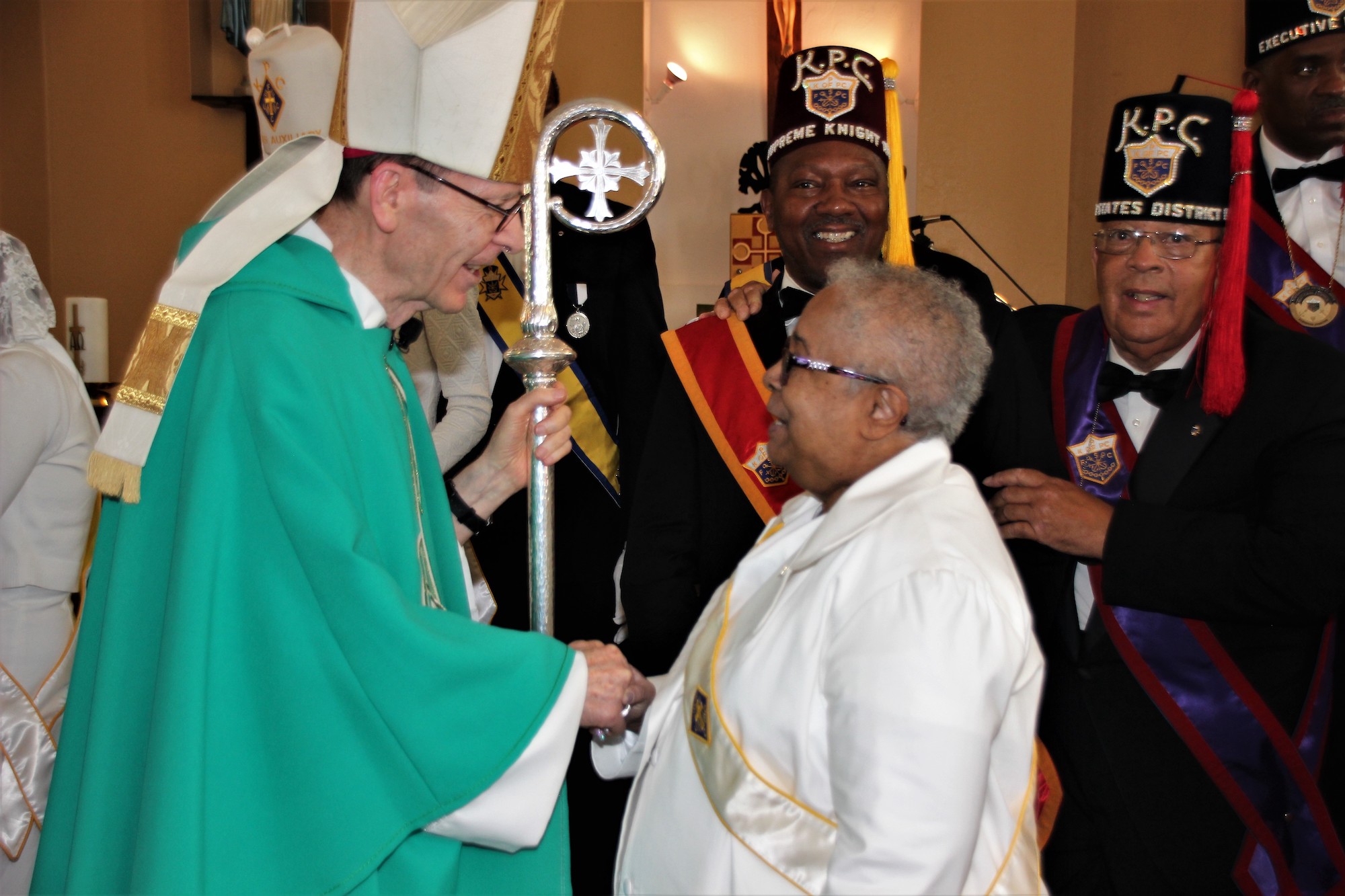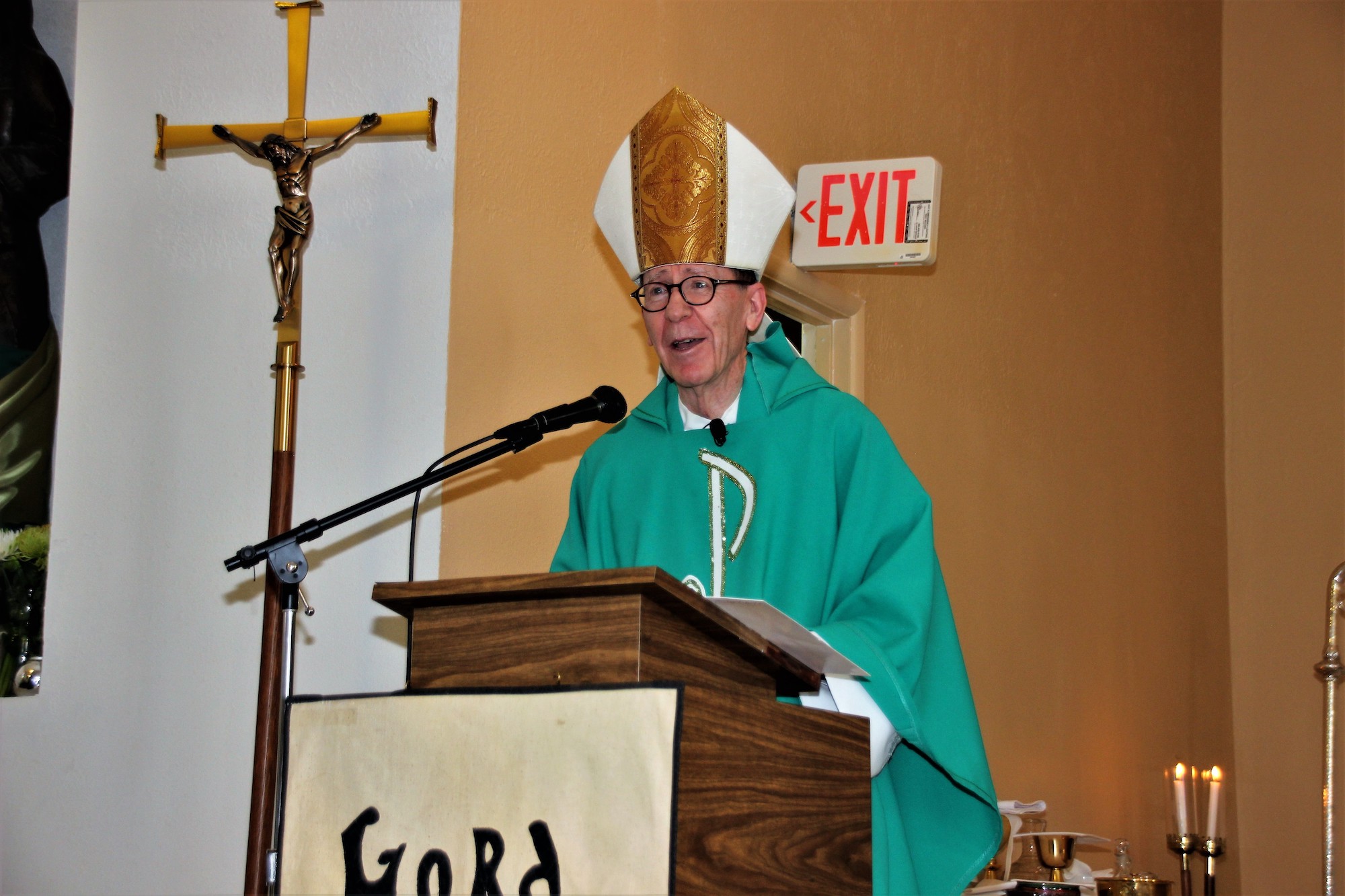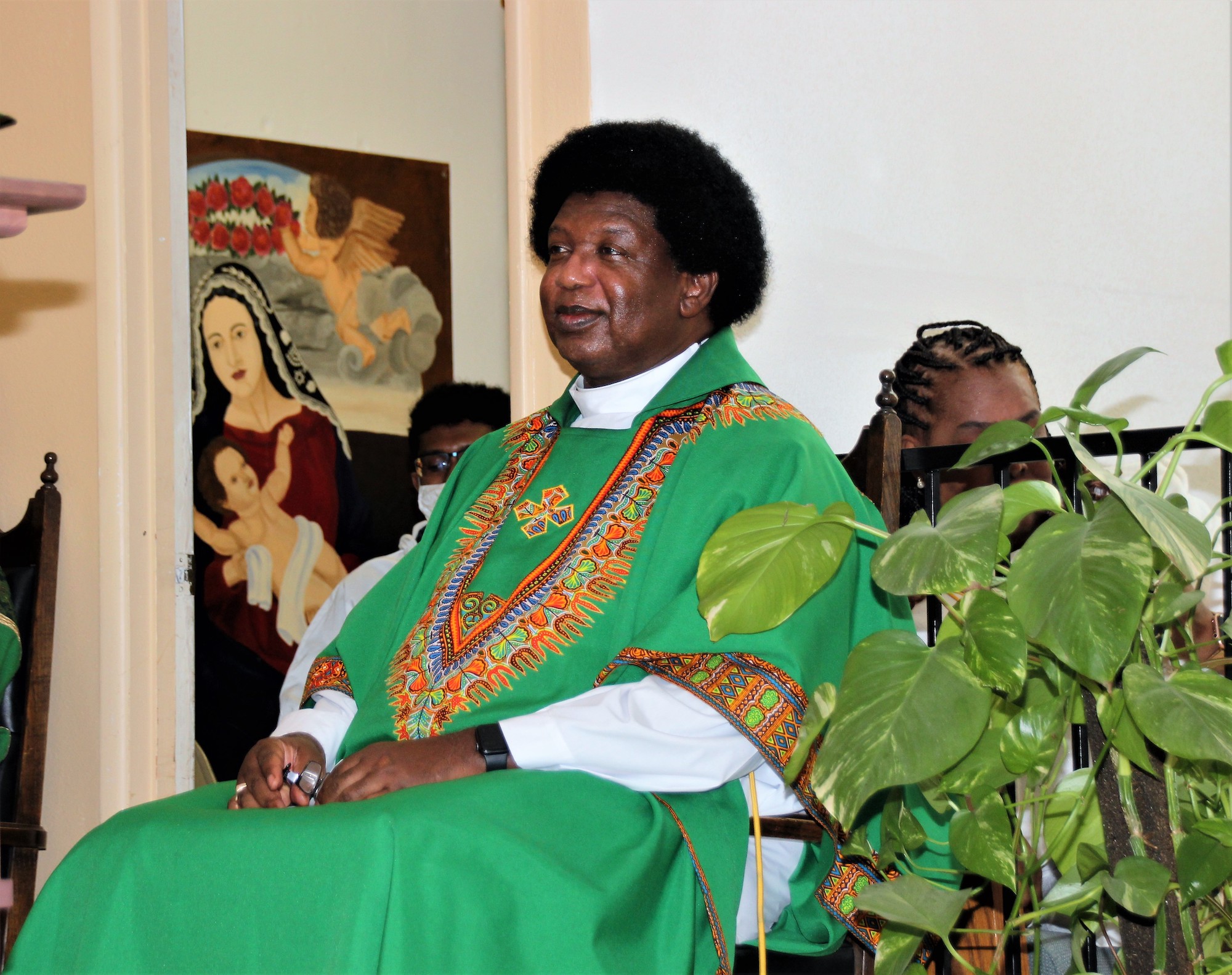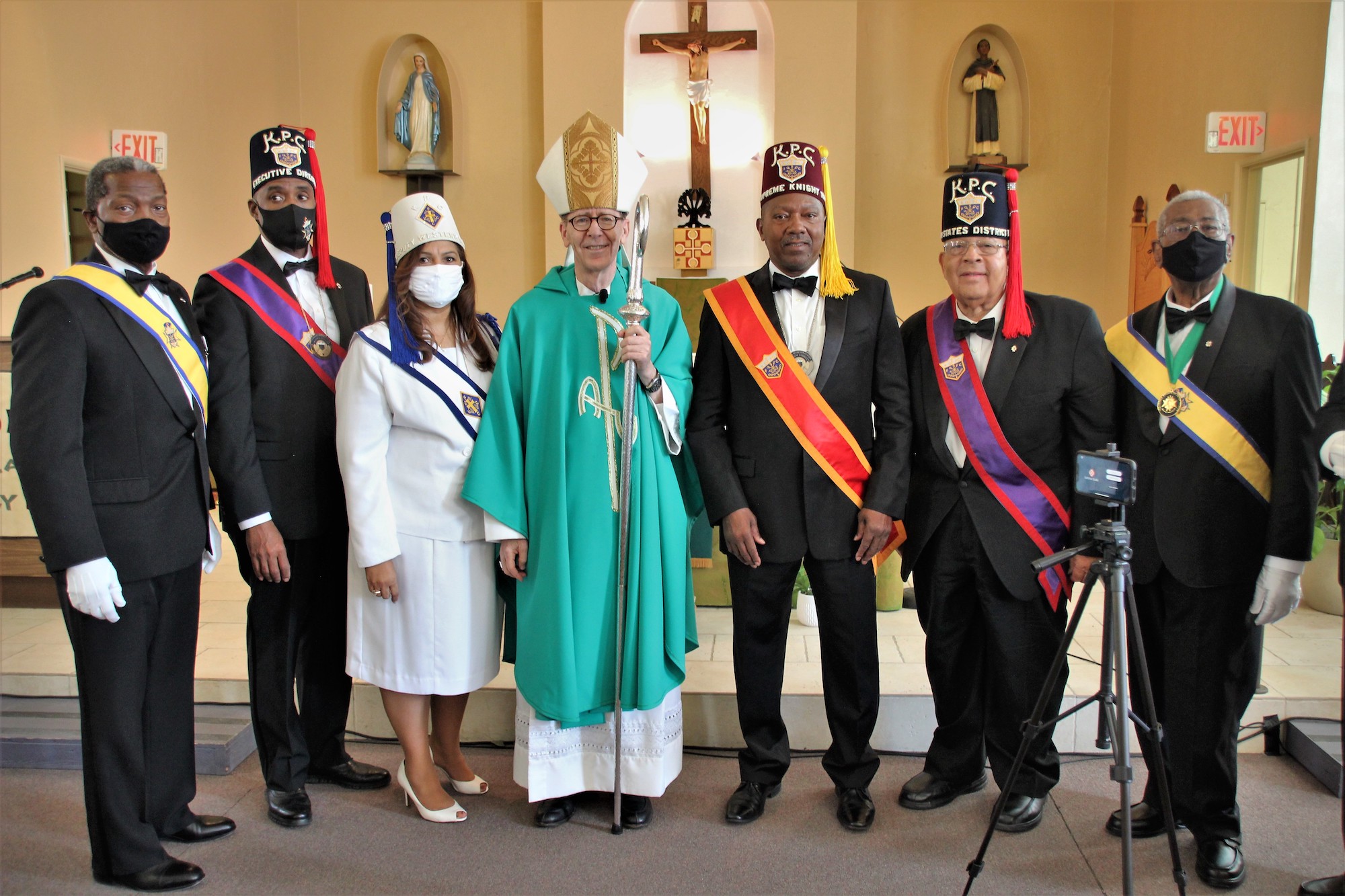
PHOENIX — As a mother, Mary Skinner wants her children to do well in life, being the best people, they can along the way.
An African American with two boys and a regular participant in the Diocese of Phoenix’s monthly Unity Mass at St. Pius X Church in Phoenix, Skinner knows the vision for her sons may not be easily realized. But she believes it can be.
“In an environment of animosity caused just by looking at someone the wrong way, everyone worries about their children, but it takes on an added dimension with African American mothers,” she explained after the Mass celebrated by Bishop Thomas J. Olmsted before nearly 100 worshippers Sept. 19.
The uneasy atmosphere Skinner described is one reason she appreciated the bishop’s message, which used Jesus’ rejection and suffering to reassure African American Catholics that God knows their pain and heartache, including that inflicted by racial division.
“Perhaps there is no time in America’s recent history when we have more needed unity, where there is almost a culture of hate, great tension and division,” the bishop said in his homily.
“The suffering of Jesus on the Cross and the suffering any of us experience in our lives, including the suffering caused by the sin of racism, must never be forgotten by the followers of Jesus Christ,” he said.
Yet, God’s love can overcome the pain.
As the Resurrection signaled evil’s ultimate defeat, so, too, the power and perseverance of love can overcome social discord, and Bishop Olmsted praised the devotion of the Unity Mass’ participants as an example.
“At this church — St. Pius X, for many years, Black Catholics and friends have gathered each month. This Gospel witness — that of unity — has lifted up the truth that every human person, no matter their race or ethnicity, deserves to be welcomed as brothers and sisters in Christ,” he continued.
“Sadly, not everyone in this city or nation knows or accepts this gift from God.”

Using the Gospel reading from St. Mark, the bishop said that working for peace and justice might be uncomfortable, but worth the uneasiness, and he challenged worshippers to worry not about the opposition but the consequences of failing to speak up or act.
“If we humble ourselves like little children — remembering we are children of God — we ask: ’What will happen to this person if I do not get involved? What will become of our city and our nation if I do nothing to defend the innocent and to work for reconciliation, unity and peace?’”
The answer, he said, is to look to Jesus for strength and renewal.
“Whenever you or I are tempted to quit, may we remember these words of St. Peter: ‘Master, to whom shall we go? You alone have the words of eternal life.’” (John 6:68)
The bishop also went beyond Scripture to drive his message.
Langston Hughes, one 20th century America’s foremost African American poets, wrote of perseverance in a poignant 1922 work titled “Mother to Son.” Bishop Olmsted read the poem, in which a mother cites her own hard life to encourage her boy to press on in difficult times:
“Life for me ain’t been no crystal stair. It’s had tacks in it. And splinters…
But all the time I’se been a-climbin’ on…sometimes goin’ in the dark…
So boy, don’t you turn back. Don’t you set down on the steps Cause you finds
it’s kinder hard…For I’se still climbin’…”
“He touched home with that,” said Skinner. ”It made me believe he is listening to us; he is hearing us. He is getting it. Now, my prayer is he keeps moving forward and taking action.”
The pastoral visit came 16 months after the death of George Floyd. Two weeks after Floyd’s death, Bishop Olmsted released a pastoral statement on racism, and a week later delivered the homily at a Mass for the Forgiveness of the Sin of Racism.
In July 2020, he announced formation of a Racial Healing and Reconciliation Commission to assist him “in identifying where bias and prejudice causes injustice in the Diocese of Phoenix.”
But the visit was the first in-person participation in the Mass at St. Pius X since Floyd’s death, and was welcomed warmly by attendees, including several leaders of the Knights of Peter Claver, a Catholic lay order dedicated to evangelizing the African American community. The organization is named after St. Peter Claver, a Jesuit missionary known as the patron saint of slaves, African missions, and interracial justice. His Feast Day is Sept. 7.
“It was a powerful message; about unity; all Catholics being welcomed into a Christian society. It reminded me there is a small percentage of Black Catholics in Phoenix, yet a good shepherd is responsible for all his sheep,” said James K. Ellis, Supreme Knight of the Knights of Peter Claver. “There was illumination of things we see and don’t want to talk about. He stepped up to some of these areas we tend to push under the rug,” Ellis said.

“The bishop’s comments were extremely insightful and gave us a lot of motivation,” offered Fr. Andrew McNair, the diocese’s chaplain to the African American Community. “I hope to take out of this a new impetus to work harder to bring the kingdom of Christ to our world. In Christ Jesus, we can find those answers we need for reconciliation and justice. The reconciliation piece is going to require more prayer and dialogue, but I think we are on the right track, absolutely,” Fr. McNair said.
“He always leaves you with so much to think about,” observed Andrea Hardin, a member of the Racial Reconciliation and Healing Commission and parishioner of St. Jerome in Phoenix “The Black community has a lot to do, and a lot to look forward to. I think this has been a wonderfully progressive year for African Americans, especially here. As mentioned in the Langston Hughes poem, it has never been easy. It is not going to be easy, but we are not going to be deterred,” she said.
Skinner, a regular attender, noted some new faces at the Mass.
“If the bishop leads us in faith, we will be able to recover people who have left the Church. I am hearing and believing his words. He could be the catalyst. It’s all about bringing in the greatness of people,” she said.
Bruce Sampson, Western States District deputy of the Knights of Peter Claver and Ladies Auxiliary and member of the organization’s national council board of directors, said, “In this country, unfortunately, we are in a difficult time; a challenging time. There have been forces that have caused us to be divisive. Across this country, I truly believe we know we have to be part of the process to make this a better place to live, reside and raise our children.”







